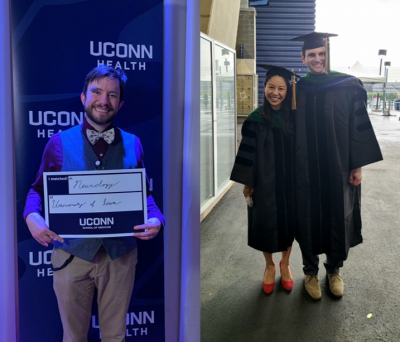Redwan Bhuiyan, of the Stitzel Lab at JAX Genomic Medicine, was awarded the prestigious NIH F30 Award. Redwan is investigating the impact of human genetic variation on human pancreatic islet stress responses in the context of diabetes.
Uncategorized
Congratulations to Tima Karginov on AHA Fellowship
Tima Karginov, an athlete, creative developer, and winner of the 2022 AHA Predoctoral Fellowship, a 2-yr. fellowship for research on T cells, RNA splicing, and cardiovascular disease.
And that’s not all. He was also awarded the 2021 AAI Young Investigator Award for top poster presentation at the Immunology Conference and the 2022 AAI Travel Award for his oral presentation at the American Association of Immunologists Conference. Well done, Tima!
Congratulations to Omar Omar Moustafa Fathy on AHA Fellowship
Omar Omar Moustafa Fathy of Dr. Patrick Murphy’s lab was award the American Heart Association Predoctoral Fellowship for his project on “Understanding the role of TDP-43 in the cerebral vasculature in neurodegenerative disease. Congratulations Omar!
Congratulations to Nathan Gasek on NIH F30 Award
Nathan Gasek of Dr. Ming Xu’s lab was award the NIH NRSA-F30 Fellowship! His research is titled: “Investigating the role of p32-highly expressing senescent cells in Alzheimer’s Dementia.” Congratulations Nathan on this huge accomplishment!
Congratulations T32 Recipients
Over the past year, several of our students have been awarded institutional research training grants funded by the NIH (more commonly known as the T32) to promote their work:
Ryan Englander: Training Program in Precision Genetics of Aging, Alzheimer’s Disease and Related Dementias
Keaven Caro: Regenerative Engineering of Musculoskeletal Tissues – a Convergence Doctoral Training Program
Mian Horvath: The UConn/JAX-GM Training Program in Genomic Science
Christopher Pathoulas: The UConn/JAX-GM Training Program in Genomic Science
Congratulations to Annie Yao on NIH F30 Award
Annie Yao was awarded the prestigious NIH F30 Award. Annie’s project under Dr. Riqiang Yan is titled “The role of beta-secretase 1 (BACE1) in modulating excitatory synaptic and circuit function and behavior.” Congratulations Annie!
Congratulations to Pearl Sutter on NIH F30 Award
Pearl Sutter, of Dr. Stephen Crocker’s lab, has been awarded the prestigious NIH Ruth L. Kirschstein F30 Award! Pearl is hard working and is a rising leader in the physician-scientist community as she pursues her passion in neuroscience. Well done Pearl!
Two UConn MD/PhD Students Inducted to Gold Humanism Honor Society
Congratulations to Anthony (Tony) Pettinato and Feria Ladha, two of our MD/PhD students in their third year of medical school, who were just voted as student inductees to the 2022 UConn School of Medicine Gold Humanism Honor Society. This honor was bestowed on only 13 of our third year medical students from a class of more than one hundred. These students were chosen by their peers and endorsed by the medical school faculty for their overall competence, community service, and kindness. Inductees are usually described as “those you would take a loved one to for care.”
The Gold Humanism Honor Society (GHHS) recognizes students, residents and faculty who are exemplars of compassionate patient care and who serve as role models, mentors, and leaders in medicine. The Society currently has over 25,000 members in training and practice. Membership in GHHS goes beyond selection and induction into an honor society. Its members have a responsibility to model, support, and advocate for compassionate, patient-centered care throughout their careers.
UConn MD/PhD Grad Participates In Pediatric COVID Vaccine Trial
UConn Health MD/PhD graduate Sonali Bracken and her family are participating in clinical trials to test the efficacy of COVID-19 vaccinations in pediatric populations. Sonali has enrolled her two children in the trial with hopes that study findings may allow children and their families to enjoy experiences they have missed over the last few years.
Sonali completed her studies in UConn Health’s Immunology Graduate Program and the School of Medicine in 2017. Following graduation, Sonali completed her residency training in Internal Medicine (Integrated Research Track) at Duke University Medical Center. She is currently a Clinical Fellow in the Division of Rheumatology and Immunology at Duke University Medical Center.
Find out more about Sonali’s experience with the trial here:
https://www.cbs17.com/news/local-news/durham-county-news/mom-of-1-and-3-year-old-in-duke-vaccine-trial-hopes-shots-will-soon-be-available-for-babies-and-toddlers/
https://www.insider.com/pfizer-covid-vaccine-trial-kids-why-i-enrolled-2021-9
Congratulations to Class of 2021 MD/PhD Graduates!

The UConn Health MD/PhD program would like to extend its congratulations and best wishes to our recent graduates Maria Xu, Nick Wasko, and Russ Posner as they transition into their residency programs. Their achievements are reflected in acceptances to top choice residency programs in Surgery at Duke University Medical Center (Xu), Neurology PSTP at the University of Iowa Hospitals and Clinics (Wasko), and Diagnostic Radiology at the New York Presbyterian Hospital/Columbia University Medical Center (Posner). We are sure they will each continue to make a positive impact on their peers and communities as they have done at UConn Health.